Rio Ferdinand and a chat with Bill James. Day 2 at the Sports Summit.
I’m going to go out on a limb and say that it’s highly likely that anybody reading this piece has also read Moneyball. That Michael Lewis book was cited often over the two days of the Sports Summit, and quite appropriately so. It’s now eleven years since its publication and its impact on sport is still being felt.
It wasn’t a book specifically about On Base Percentage, and it wasn’t written by Billy Beanei or Bill Jamesii. It was primarily about finding and acquiring undervalued assets, be it in terms of players or playing strategy. Beane and James featured prominently in the book as protagonist and mysterious stats savant respectively, so it was my great pleasureiii to moderate a panel featuring Bill James at the Sports Summit.
The panel was “The Value of Statistics in Sport” and included Sean O’Connor of Irish GPS data company StatSports along with Tony Strudwick, head of athletic performance at Manchester United.
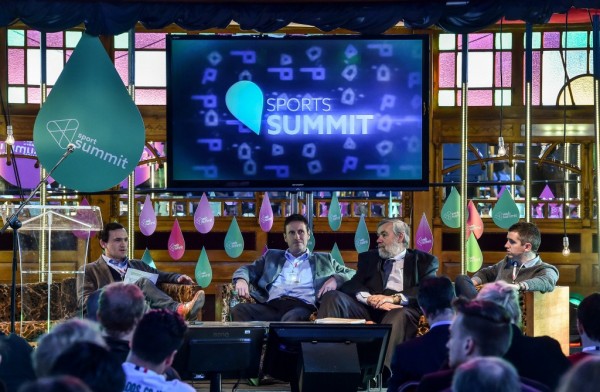
Andy McGeady, Tony Strudwick (Man Utd), Bill James (Boston Red Sox), Sean O’Connor (StatSports).
Picture credit: Ray McManus / SPORTSFILE / Web Summit
While it’s for others to say whether the panel was entertaining, interesting or stultifyingly dull, from the point of view of somebody on the stage some points jumped out. I started the discussion by asking Bill James if a lot of the stats work he saw in the media, and indeed even in clubs, was just so much bullshitiv.
“Statistics are just details, and they don’t rise to the level of true bullshit. True bullshit is general; statistics are always specific. So a lot of it’s useless, and can be compared to bullshit in that sense, but I wouldn’t say it rises to the level of true, genuine, authentic, bona fide… BS”
That answer got things rolling along nicely. Over the next 20 minutes Sean, Tony and Bill discussed which stats are actually useful, whether intuition can ever be replaced by stats, the importance of psychology, and others. The crowd was decent in size and hopefully enjoyed it. I certainly did.
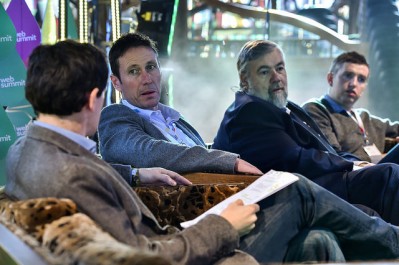
Picture credit: Ray McManus / SPORTSFILE / Web Summit
Later that morning Henk Ten Cate would express doubt about about the validity of applying stats to football. Physiological testing, yes; “testing is knowing”, said Ten Cate. But when it comes to playing the game he said that a coach might tell a player to play a certain way in order to help the team win. But after the game their stats might be very poor. To me, in the audience, that spoke of there being a gap in the stats.
As an aside, Ten Cate was on the panel with Viktor Huszar of Teqball, a training tool similar to a curved ping pong table. I spoke to one conference attendee later who said that having a Teqball table at the Sport Summit would have seemed an obvious thing to do. I agreed. Perhaps next time.
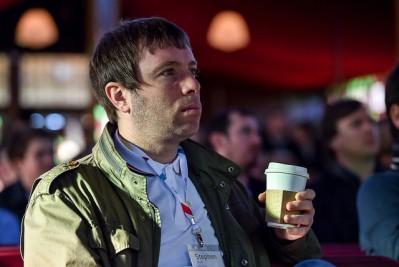
An audience member pays close attention at the Sports Summit. Ray McManus / SPORTSFILE / Web Summit
Damien Comolli‘s panel, moderated by Joe Molloy, received quite a bit of media attention. Comolli might well be perceived as a failure of the “Moneyball” approach to football, given his input into the signings of Andy Carroll, Stuart Downing and Jordan Henderson. Didn’t do too badly with Luis Suarez though. Molloy prodded him gently a couple of times about Carroll, but apart from the ungainly, ponytailed one Comolli still comes across as quite bitter about the Henderson deal in particular:
“I’ve never been told why I was sacked but I was led to believe it was because we signed Jordan Henderson and the owners were convinced he was not good enough”
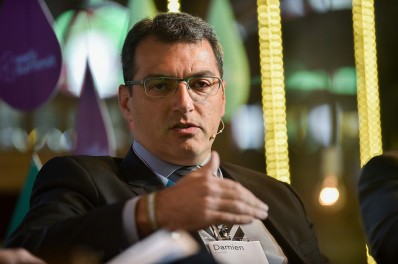
Damien Comolli speaks at the Sports Summit. Picture credit: Brendan Moran / SPORTSFILE / Web Summit
Comolli described how the amount of chances Henderson had created playing for Sunderland, taking his young age at the time into account (and the fact he was playing for Sunderland), meant that he had been undervalued by the market. It’s obvious that he still firmly believes this. And he said it wasn’t just Liverpool who might have been skeptical about the deal:
“Even directors from Sunderland a few months later [told me]: you didn’t know what you were doing”
Jeremy Schaap‘s one-to-one discussionv with Rio Ferdinand provided the crowd management challenge of the two days. The former Manchester United man arrived two sessions before his time slot and the place was mobbed. I was seated a couple of rows from the front and, looking around, the place was heaving. The platform around the central seated area was filled completely with standing observers and photos circulated on Twitter of the queues of eager latecomers left outside the stage entrance.
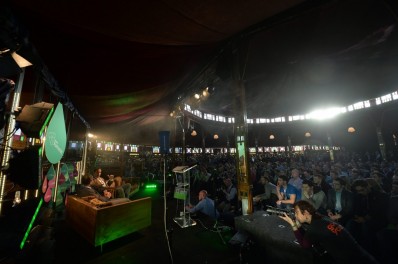
Sports Summit crowds listen to ESPN’s Jeremy Schaap talking with Rio Ferdinand. Picture credit: Brendan Moran / SPORTSFILE / Web Summit
Schaap opened up swinging, asking about Ferdinand’s decision not to appeal his ban brought about by a tweet that had been deemed to have been ill-worded. It was a topical start, and one that grabbed the attention of both the interview and the audience. Beyond simply being of the moment it was also a good segue into a chat about how Ferdinand has actively (and consciously) used social media as a way of reforming his image, an image that he had considered to be both incorrect and damaging.
Rio doing the school run. Just like anybody else.
Rio getting the train. Just like anybody else, except with a First Class ticket.
Rio, perhaps not the wide boy from Peckham that might have been the perception not that long ago.
When Mr. Ferdinand retires he intends to be a member of the media, with BT Sport. He said he believed that without this re-positioning of his image there’s no way he would be able to enter such a job. Which might, or might not be at the end of this season.
Tony Hawk and David Epstein closed things off on Day 2, the final act at the Sports Summit. I wasn’t a skateboarder as a kid; the one that I was given for Christmas spent more active service as something to help move sideboards and sofas rather than speeding around the neighbourhood pretending it was a stunt double from Back to the Future. But even I know who Tony Hawk is.
Another healthy Spiegeltent crowd watched as the skateboard legend was interviewed by the American journalist, with the former mobbed on stage when the talk finished. That kind of adoration was a conclusion more fitting of a music concert than a convention, even one on sports. So it was appropriate that the Sport Stage should then have been transformedvi overnight into the Music Stage for the following day.
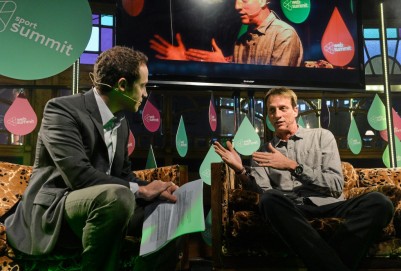
David Epstein and Tony Hawk.
Picture credit: Diarmuid Greene / SPORTSFILE / Web Summit
I haven’t covered all the 33 sessions over the two days and don’t intend to.Some in attendance will have wondered how I could have liked presentation X and disliked Y. That’s the nature of it.
As the crowds filtered away I recorded a couple of podcast segments then went off into the night to join another couple of hacks for some dinner.
A good time had by all, I think. And I for one hope that the Sport Summit will return next Autumn.
A few learning points for the Sports Summit:
“Advertorial” presentations: I’m not a huge fan of these taking key slots in the schedule; perhaps they could be inserted at lunchtime or at other breaks in the day. Product demonstrations are valuable components of a conference’s business model, but ideally they need to join the day at some natural point. Ad breaks are fine; we’re used to them on TV.
Get the sports startups involved: Where were they? In a tech conference of 20,000 attendees one would imagine that there were at least a couple of startups with an interest in sports, be that at the professional or consumer/lifestyle level. I finally stumbled upon a sports startup on the Thursday afternoon, after the Sports Summit had ended. Perhaps make these folks easier to find.
Add a few sports tech gimmicks: The sponsors paying for time on stage could also have demo positions around the place. The Teqball table, for example. Keep people nosing around the place.
Heat: My god, the heat. Even in temperatures that sank to about three degrees celsius outside the Sports stage reached uncomfortable levels of heat during some of the more well attended presentations. It’s a small thing.
Day 1 at the Sports Summit: http://www.andymcgeady.com/stats-spiegeltents-day-1-sports-summit/
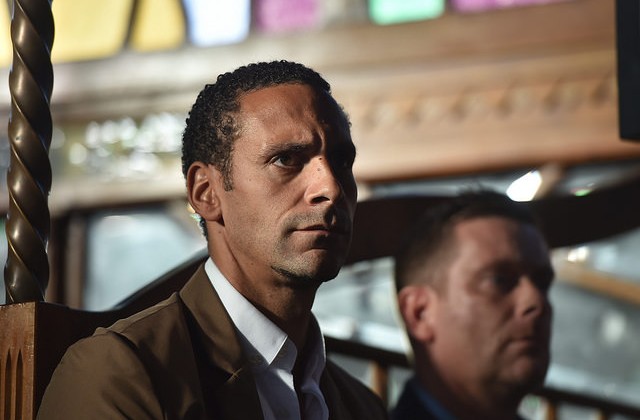

Comments
3 Responses to “Rio Ferdinand and a chat with Bill James. Day 2 at the Sports Summit.”Trackbacks
Check out what others are saying...[…] Next up: Day 2 […]
[…] Sports Summit, Day 2 […]
[…] Day 2 at the Sports Summit […]